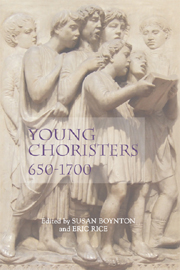Book contents
- Frontmatter
- Contents
- List of Illustrations
- List of Musical Examples
- Acknowledgements
- Dedication
- Introduction: Performance and Premodern Childhood
- 1 The Boy Singers of the Roman Schola Cantorum
- 2 Boy Singers in Medieval Monasteries and Cathedrals
- 3 The Musical Education of Young Girls in Medieval English Nunneries
- 4 Choirboys in Early English Religious Drama
- 5 From Mozos de coro towards Seises: Boys in the Musical Life of Seville Cathedral in the Fifteenth and Sixteenth Centuries
- 6 The Seeds of Medieval Music: Choirboys and Musical Training in a Late-Medieval Maîtrise
- 7 Choirboys in Cambrai in the Fifteenth Century
- 8 Choirboys and Vicaires at the Maîtrise of Cambrai: A Socio-anthropological Study (1550–1670)
- 9 Choirboys, Memorial Endowments and Education at Aachen's Marienkirche
- 10 Thomas Mulliner: An Apprentice of John Heywood?
- 11 Cantando tutte insieme: Training Girl Singers in Early Modern Sienese Convents
- 12 Choirboys in Early Modern Rome
- General Bibliography
- Index
6 - The Seeds of Medieval Music: Choirboys and Musical Training in a Late-Medieval Maîtrise
Published online by Cambridge University Press: 12 September 2012
- Frontmatter
- Contents
- List of Illustrations
- List of Musical Examples
- Acknowledgements
- Dedication
- Introduction: Performance and Premodern Childhood
- 1 The Boy Singers of the Roman Schola Cantorum
- 2 Boy Singers in Medieval Monasteries and Cathedrals
- 3 The Musical Education of Young Girls in Medieval English Nunneries
- 4 Choirboys in Early English Religious Drama
- 5 From Mozos de coro towards Seises: Boys in the Musical Life of Seville Cathedral in the Fifteenth and Sixteenth Centuries
- 6 The Seeds of Medieval Music: Choirboys and Musical Training in a Late-Medieval Maîtrise
- 7 Choirboys in Cambrai in the Fifteenth Century
- 8 Choirboys and Vicaires at the Maîtrise of Cambrai: A Socio-anthropological Study (1550–1670)
- 9 Choirboys, Memorial Endowments and Education at Aachen's Marienkirche
- 10 Thomas Mulliner: An Apprentice of John Heywood?
- 11 Cantando tutte insieme: Training Girl Singers in Early Modern Sienese Convents
- 12 Choirboys in Early Modern Rome
- General Bibliography
- Index
Summary
6 JUNE 1491 was a day of high drama at the collegiate church of Saint-Omer in northern France. At a meeting held that day, the chapter officially fired the succentor, Malin Alixandre, from his post as master of the church's six choirboys and ordered his removal from the house that he shared with them. This action stimulated a quick and strident response from the church's cantor, Jehan de Hemont, who was emphatic that the right of hiring and firing the master of the boys was his alone. For its part, the chapter claimed that the cantor's business was limited to overseeing the maintenance and instruction of the boys and their house, and that the right of appointment was theirs alone. Enraged at what he perceived as an infringement of his rights of office, the cantor walked out of the chapter meeting saying that he would resort to the process of law.
That Hemont was indeed within his rights seems clear repeatedly from the wording of chapter entries detailing appointments of masters of the boys, including one whereby, little more than three months earlier, Alixandre had himself been assigned to the position from which he was now being ejected:
On the twenty-first of February the lord and master Johannes de Hemont, cantor of this church to whom it concerns by reason of his office to present a master learned in singing for the instruction of the six choirboys, this day in the accustomed fashion presented to my lords in chapter lord Malin Alexandre, whom the lords graciously admitted.
- Type
- Chapter
- Information
- Young Choristers, 650–1700 , pp. 104 - 122Publisher: Boydell & BrewerPrint publication year: 2008



